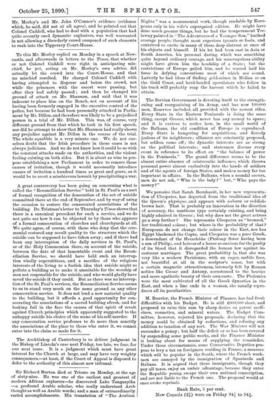A great controversy has been going on concerning what is
called the " Reconciliation Service " held in St. Paul's as a sort of formal recognition of the desecration of the act of suicide committed there at the end of September, and by way of using the occasion to restore the consecrated associations of the building. Dr. Tristram's letter to Thursday's Times shows that there is a canonical precedent for such a service, and we do not quite see how it can be objected to by those who approve of a formal consecration of churches and churchyards at all. We quite agree, of course, with those who deny that the cere- monial restored any occult quality to the structure which the suicide can be supposed to have taken away ; and if there had been any interruption of the daily services in St. Paul's, or of the Holy Communion there, on account of the suicide, between the date of that lamentable event and the Recon- ciliation Service, we should have held such an interrup- tion wholly superstitious, and a sacrifice of the religious interests of the living to a foolish idea that suicide might so pollute a building as to make it unsuitable for the worship of men not responsible for the suicide, and who would gladly have saved the suicide if they could. But as there was no interrup- tion of the St. Paul's services, the Reconciliation Service seems to us to stand very much on the same ground as any other consecration service. It does not lend a new material quality to the building, but it affords a good opportunity for con- secrating the associations of a sacred building afresh, and for looking fall in the face the causes of that spirit of revolt against Church principles which apparently suggested to the unhappy suicide his choice of the scene of his self-murder. If any consecration service professes to do more than sanctify the associations of the place to those who enter it, we cannot enter into the claim so made for it.






































 Previous page
Previous page